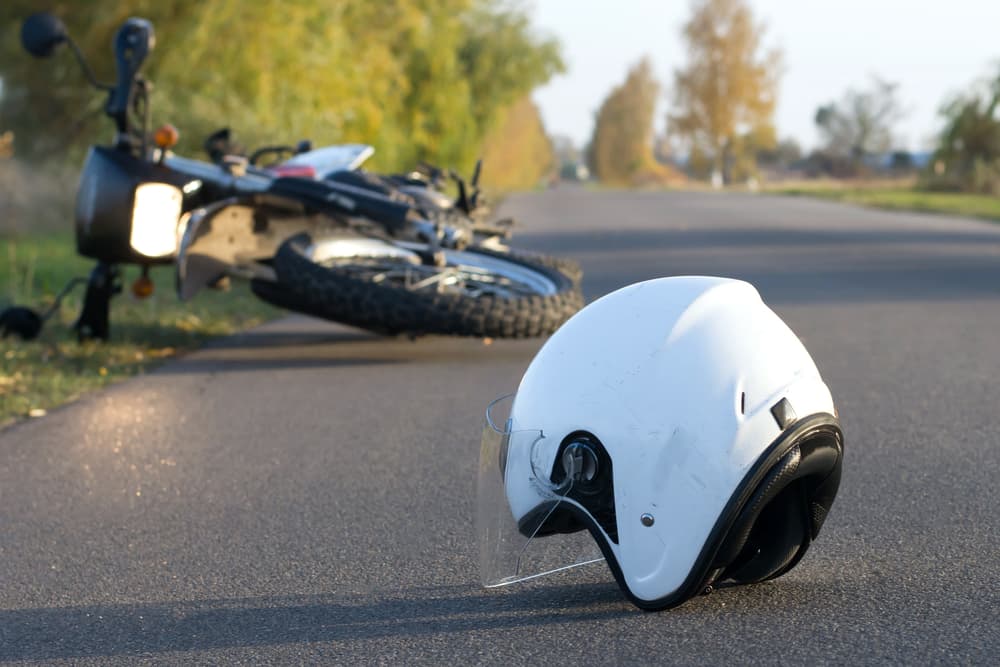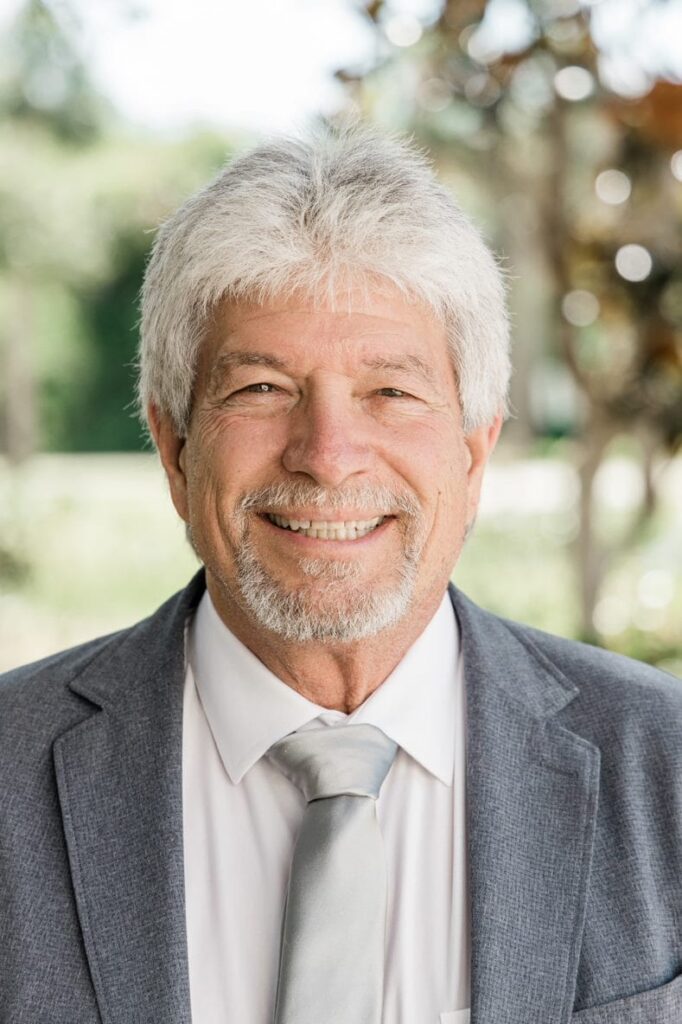Motorcycle accidents victims will often struggle with life-changing physical, financial, and legal challenges. Having a motorcycle accident lawyer navigate this crucial period on your behalf can pave the way to protecting your health and recovering fair compensation.
Schedule A Consultation Today!
Steps to Take Immediately After a Motorcycle Crash

After a motorcycle accident, the biggest priority at the crash scene is ensuring you're safe from further harm. Secondary collisions are a genuine risk in these chaotic situations, so if possible, move yourself and your bike off the traffic path. If you can't move, turn on your hazard lights, signal for help, and wait for emergency services.
If you're out of immediate danger and not carrying serious injuries, follow these steps to protect your legal interests—if you can do so safely:
Take Photos and Videos of the Scene
Visual evidence from the accident scene can strengthen your personal injury claim.
Use your phone to document essential details, such as:
- The positions of the vehicles involved.
- Any relevant features on the road.
- Visible injuries.
- Damage to your motorcycle or belongings.
- Skid marks, debris, and other types of physical evidence.
Documenting the scene can help your attorney piece together the causes of the accident, providing valuable context to establish the other party's negligence.
Talk to Witnesses
Any witnesses can fill gaps in your recollection and support your case for compensation with an unbiased, third-party view. Gather their names and contact information and ask them for a brief statement. Their perspective can reveal factors you won't have noticed, such as another driver's erratic behavior.
Don't Accidentally Admit Fault to Police Officers
When speaking with the responding police officers, you should be honest and factual but avoid any phrasing that could imply guilt. They may misconstrue statements such as “I didn't see them” or “I'm sorry” as admissions of fault.
Remember that the officers will record your words, and the legal process may use them against you. Even innocent-seeming remarks can lead to confusion. Explain your experience, but let the facts speak for themselves.
Seek Medical Attention Immediately
Don't underestimate the importance of seeking medical attention after a motorcycle crash, even if you don't feel gravely hurt. Adrenaline can mask the pain from many less apparent injuries that might have profound implications later. These incidents may cause hidden injuries, such as internal bleeding or concussions due to brain trauma. Early medical assessment can spot and prevent these from becoming more serious.
Immediate medical care protects your health and creates an official record of your injuries essential for substantiating your personal injury claim. It can make a difference in your recovery and the effectiveness of your legal claim.
Steps to Take After a Motorcycle Accident
Following a motorcycle accident, focus on your physical well-being and building a solid foundation for legal action. Actions taken during this time can significantly influence the outcome of your case. The priorities for recovering compensation for your damages include:
Avoiding Speaking Directly to the Other Party's Insurance
Insurance companies representing the liable party may contact you. They might record conversations and use them against you, potentially damaging your claim. Even an innocent remark can have consequences you don't intend, so never discuss anything relating to the accident, or your resulting injuries, without first talking to your lawyer.
Keeping Up With All Your Medical Treatments and Appointments
Make your health your priority after a serious accident, so follow your doctor's advice and attend all medical appointments, including physical therapy and follow-up visits.
On the legal side, your medical record is among the most critical pieces of evidence influencing your compensation case. Documenting your injuries and being consistent with your care is significant in building a stronger, more persuasive claim.
Maintaining Detailed Records Throughout Your Recovery
Being methodical and organized in documenting every aspect of your recovery can be the difference in validating your claim.
Keep track of everything relating to your recovery, including:
- Medical bills and receipts.
- Prescription costs.
- Physical therapy or rehabilitation expenses.
- Out-of-pocket costs, such as travel to appointments.
- Days absent from work.
This meticulous approach extends beyond medical expenses. Write a daily or weekly journal detailing your recovery. This document should describe pain levels, emotional states, physical limitations, and how your injuries influence everyday life.
A recovery journal can paint a vivid picture of your suffering and rehabilitation process, further strengthening your personal injury claim.
Contacting a Motorcycle Accident Lawyer
Hiring an experienced lawyer early in the process means you have an advocate who can navigate the complex personal injury claim process and fight for your interests. With proper legal support, you can avoid common mistakes and optimize your chances of recovering fair compensation.
The path to recovery following a serious motorcycle accident can be challenging. Following these steps empowers you to navigate the legal process, strengthening your position.
The Consequences of a Motorcycle Accident
The consequences of a motorcycle accident can stretch beyond the incident and influence many aspects of your life. Some of the toughest post-accident challenges you can face are:
Long-Term Physical Injuries
Motorcycle accidents can cause significant injuries that can take a long time or forever to heal. These include:
- Broken bones.
- Traumatic brain injuries.
- Spinal cord injuries.
- Internal organ damage.
- Major scarring from road rash.
These injuries can skew your life's trajectory, leading to chronic pain, ongoing medical treatment, or permanent incapacity.
Emotional and Mental Effects
You could face emotional and psychological challenges, such as:
- Post-traumatic stress disorder: Flashbacks, nightmares, and anxiety can disrupt daily life.
- Depression: Changes in physical capacity or lifestyle often lead to sadness or hopelessness.
- Anxiety: Fear of riding a motorcycle or driving a car again can limit personal freedom.
These conditions may require counseling or therapy, adding to the long-term financial costs of the accident.
Financial Implications
A motorcycle accident's physical and emotional effects can result in a loss of income due to your incapacity to work. Your loss of faculty may necessitate purchasing mobility aids, retrofitting your home, or hiring caregivers. You may face thousands of dollars in motorcycle repair or replacement costs and bills for other property damage. Proper compensation can cover the otherwise devastating cumulative effect of these expenses.
You May Deserve Compensation for Your Damages
If someone else's negligence caused the accident, you could recover compensation for your damages.
A comprehensive personal injury claim can cover:
- Medical bills: These include immediate care, ongoing treatment, and future medical expenses.
- Lost income and earning capacity: Compensation can replace earnings lost due to your incapacity to work.
- Pain and suffering: This considers physical pain and emotional distress resulting from a serious accident.
- Loss of enjoyment: If you can no longer participate in hobbies or activities due to the seriousness of your injuries, your compensation can reflect this.
These difficulties, and the complexity of the legal process for pursuing compensation after a motorcycle accident, underscore the importance of employing an experienced lawyer. The right attorney can understand and demonstrate the extent of your damages and advocate for a fair settlement.
Understanding the Role of Insurance in Motorcycle Accidents
Filing an insurance claim is the primary avenue for seeking compensation after a motorcycle accident. Your lawyer can file this claim with the at-fault party's insurer or your policy. Dealing with insurance companies is a complicated and challenging process: collecting all relevant evidence, filling out detailed forms, adhering to strict deadlines, and communicating with insurance representatives who may not work in your best interests.
Common Strategies Insurance Companies Use To Deny or Reduce Compensation
When the insurance company receives your claim, it begins an investigation to decide whether you deserve compensation and how much it owes you.
If you file your claim against the at-fault party's insurance, the company focuses on the level of its policyholder's culpability and the extent of your damages.
Regardless of the circumstances of the crash, these profit-driven companies will try to pay as little as possible by undermining your claim or rejecting it.
The strategies they use include:
- Disputing liability: The insurance company might argue that you contributed to the accident to lessen or negate your compensation.
- Downplaying injuries: They might claim your injuries aren't as serious as you say or the accident didn't cause them.
- Employing delaying tactics: They may draw out the process, hoping to pressure you into accepting a subpar settlement out of desperation or financial need.
- Misinterpreting statements: The insurance company could twist your words or take them out of context.
Insurance companies have lawyers working to protect them, so hire a legal professional to protect you. An experienced motorcycle accident attorney can provide the guidance and support to counter these tactics.
The Importance of Professional Legal Representation After a Motorcycle Accident
After a motorcycle accident, it's common for the complexities of the legal process to overwhelm you, especially while you're recovering from your injuries. A lawyer with experience handling the specific issues of motorcycle accidents can protect you.
Some ways your attorney can best position your case include:
- Explaining your legal options: Your lawyer can assess your situation and all the avenues for recovering compensation to develop an effective legal strategy and make sensible decisions.
- Determining liability and damages: Establishing liability and quantifying your economic and noneconomic damages can allow your attorney to build a persuasive case to maximize your compensation.
- Negotiating with insurance companies: Your attorney can level the playing field, improving your chances of reaching a fair settlement.
- Providing peace of mind: Your attorney's role is to represent you, handle all the legal complexities, and protect your rights, allowing you to concentrate on your recovery.

A motorcycle accident can have lasting repercussions for your health, well-being, and financial stability. You don't have to face these challenges alone: Taking the proper steps after an accident and hiring a skilled personal injury lawyer can protect your legal rights and recover the resources you need to move on with your life.
